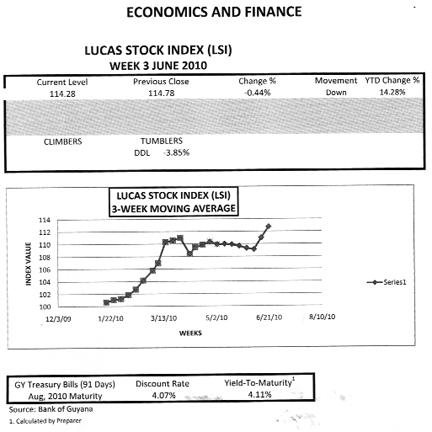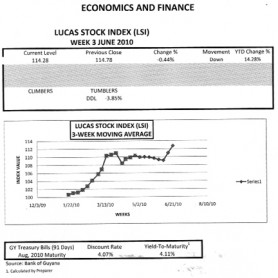Mr. Lucas has agreed to serve as a columnist with the Stabroek Business and will be contributing articles on economic, financial and development matters.
By Rawle Lucas
Diaspora
In exactly 34 days the people of Victoria will gather to consider how to change the economic and social situation facing them. They plan to convene a conference from August 5, 2010 that will involve Victorians and other Guyanese from home and abroad. The conference which will be hosted by the Victoria Reconstruction Trust (VRT), is a non-profit organization established in February 2003 to stimulate entrepreneurial activity and foster the renewal of the village. The VRT is being joined by members of the Victoria Diaspora and friends in its efforts to make the conference a reality.
While villagers will deliberate their future and that of their village in two days, the event will last until Sunday when participants, will have an opportunity to pray together and bless the resolutions and commitments of the forum at a church.
Seminal importance
The event is of seminal importance to the people of Victoria, who for many years, made important contributions to Guyana’s economic progress. The village was involved in both agricultural and industrial activities and its economic life was made up of the manufacture of soft drinks, the production of coconut oil, starch, cassava bread and casareep among other products.
Many of these industries have disappeared or dwindled in size and new economic investments have bypassed the village. Despite indications of the favourable impact of private sector loans on agricultural output, entrepreneurial efforts at farming activities are stymied by insufficient access to finance. In other instances, improper drainage and irrigation interfere with the best efforts of residents to contribute positively to the national food supply. Economic production is also adversely affected by the unavailability of adequate human resource skills for use in the village.
Hardships
Consequently, the people of Victoria are experiencing severe hardships. More than 50 percent of the labour force of the village is unemployed. With nearly 60 percent of its labour force under the age of 35, the unemployed primarily constitutes the youth of the village. Serious social problems have begun to emerge with threats to public safety and security. Nearly 70 percent of Victorians working in Guyana either walk or depend on public transportation to get to work. At the same time, less than three percent of the workers can afford their own transportation. Sharp increases in transport prices mean sharp increases in hardships by workers from Victoria. Between 2004 and 2009 that meant a 15 percent increase in the cost of getting to work and 15 percent less money available for use in the home. The conference aims to discover, analyze and document opportunities and challenges with a view to finding workable solutions to some of the challenges confronting the village and its residents.
The success of the conference hinges on the involvement of ordinary Victorians and their willingness to articulate their concerns and advocate options to help them improve their lives. Thus, the conference seeks to provide residents with a platform on which to promote and pursue their aspirations for a better community and improvements in their personal, economic and financial lives.
Prevail
The nexus between Victoria and the rest of Guyana resides in an important but not well-known vault of the nation’s history. Victoria was the first village established in Guyana by people who had been freed from slavery. Thus, the village became an important contribution by Guyanese of African descent to the evolution of Guyana’s spatial development. Victoria became an important addition to the villages that existed beyond the coastline of Guyana among the Amerindian communities. The history of slavery in Guyana is well-known but not often well told. However, the ex-slaves who established Victoria lived in Guyana under the most difficult and inhospitable conditions. The acquisition of land to establish the village is testimony that all things are possible when dedication and determination are applied to a problem. The purchase of Victoria was evidence of their successful quest for freedom and that, despite the odds, those with a determined spirit would eventually prevail to secure a comfortable place for themselves and their descendants.
Long before the spirit of cooperatives became a model for economic opportunity, the concept was embraced by the founders of Victoria. None had enough money on his or her own to acquire land and retain it these pioneers recognized that and came together. Through their cooperation, they achieved what each could not on his or her own. Victorians need to summon a similar innovative spirit today to push back against the deadweight of apathy and to peel back the shades of hopelessness that hover over it now and threaten to follow it into the future.
Against the foregoing, the conference represents an opportunity for renewal and rekindling of the spirit of the founders of the village. By bringing together the minds of Victorians and other Guyanese, there is the added chance to forge a path of development that places Victoria once again at the head of the “village class” in Guyana.
LUCAS STOCK INDEX
In week three of June 2010, the Lucas Stock Index (LSI) declined by four-tenths of one percent. The slight decline is attributed entirely to the decline in the stock price of Demerara Distillers (DDL). The change was insufficient to alter significantly the gains made by the LSI for the year. The gain of the LSI which stands at 14.28 percent places it three and a half times higher than the yield on the risk-free Treasuries that would mature in August 2010.






